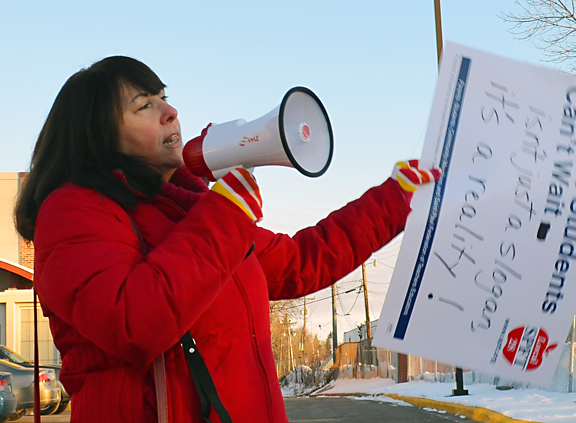

Share
When she and her friends played school as kids, Denise Rodriguez was always the teacher. As a teenager she dreamed of teaching Spanish at Harding High School, just like her favorite teacher.
Now Rodriguez, president of the St. Paul Federation of Teachers for the last three years, is set to retire June 12 after 39 years living out her dreams – some old, some new – in the St. Paul Public Schools. (Nick Faber, currently serving as vice president of the local, has been elected to succeed Rodriguez as president.)
“Denise has been a great leader and an influential ally to organizations like ours,” St. Paul Regional Labor Federation President Bobby Kasper said. “She is a true friend.” Rodriguez talked about her experiences and the future of public education in an interview with the Union Advocate, the publication of the St. Paul Regional Labor Federation.
UA: What sparked your interest in teaching?
DR: “In high school they said maybe I should think of being something else because there were too many teachers at that time. But I knew what I wanted to be. I wanted to return to Harding High School and be a Spanish teacher. And I did.”
UA: Was it a dream come true?
DR: “Yes, it was. It’s where I always wanted to be. I liked to be able to have the students feel excited about what I was excited about – about Spanish. I love seeing how their faces change when they really get something, when it really makes sense to them.”
UA: How did you become active in SPFT?
DR: “About 19 years ago, our building steward asked me to be a steward. It just goes to show that when we do our union work, we can’t underestimate the importance of talking to people face to face…
I would come to the union offices in the evening after teaching all day and would be so exhausted, but my work here energized me. I found my second passion in life.”
UA: SPFT members have expanded the scope of issues their union negotiates. How effective has it been?
DR: “It’s called bargaining for the common good. It’s a way of organizing along with the community and using contract negotiations to bargain for a set of demands that make a more equitable learning environment for our students. Our contract is the most powerful tool we have to improve our students’ learning conditions.
“Four years ago we got some things we’ve never gotten before – contract language around smaller class sizes, getting the district to commit to having more (support staff), a 25 percent reduction in testing… We’ve also elevated and incorporated racial equity into the work of our union. We’ve organized parents to increase our collective power. This is the work that has really energized me.”
UA: Is it fair to say St. Paul teachers are on the cutting edge in this approach to bargaining?
DR: “They are, and I’m very proud of them. After we settled the contract in 2013, we started to get invited to visit (unions) across the country to talk about the work we’re doing. Now we’ve started the St. Paul Institute, where we train members from around the country in how to use their contract negotiations to bargain for the benefit of the community.”
UA: What trends have you seen emerge in education that you’re concerned about – and is union activism an effective way to address them?
DR: “Public education is facing unprecedented threats. Unions are being attacked. Teachers in some states have lost the right to collectively bargain, so it’s more important than ever to stand together with the community, to show our districts and our school boards what we want for our schools, what we want for our students.”
UA: What’s the next step for you?
DR: “Hopefully I’ll be able to come back and continue some of this work with the St. Paul Institute. I have a grandson who’s going to play football in college on a full-ride scholarship, so hopefully I will be able to watch him too.”
UA: And what’s next for SPFT?
DR: “Right now there are all these budget cuts and budget deficits. People say there’s no money. Well, scarcity is a myth. We have enough money in this state to fully fund our public schools. In St. Paul we want to look at corporations who are not paying their fair share in taxes – and look at all of the different non-profit property owners that really are making profits.”
UA: We learned a lot about non-profits during the Allina nurses’ strike, didn’t we?
DR: “That’s exactly it. They have billions in offshore accounts. The money is there. Now it’s time to start to call on them to pay their fair share.”

